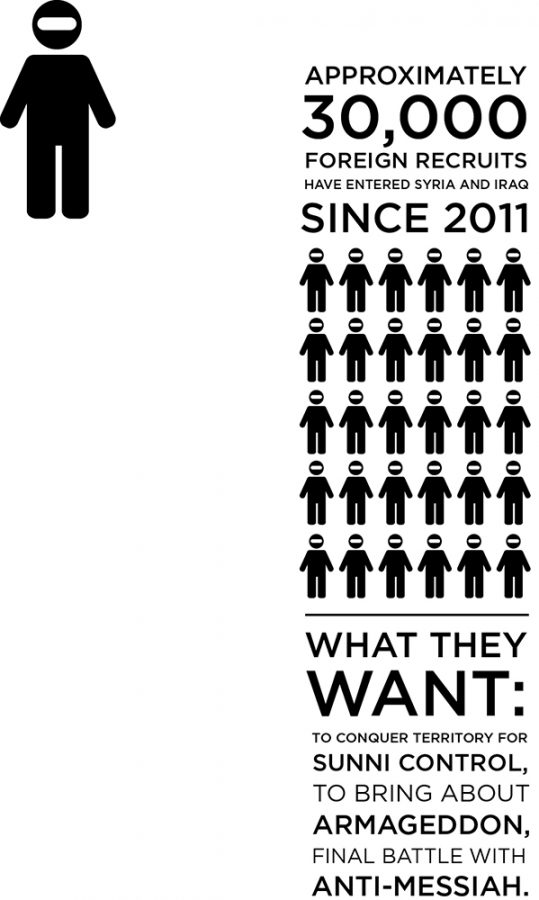Understand ISIS from the big picture
Jacqueline Lewis gives context of ISIS’s origins and argues for the importance of understanding the group.
November 11, 2015
It seems surreal — something out of fiction — to hear of fellow humans banding together, conquering territory and committing unspeakable atrocities — all to bring about an apocalyptic religious war fantasy.
Much misunderstanding surrounds ISIS, or the Islamic State in Iraq and Syria. Many hear news of their actions or a nation’s attempt to fight them, but the context of the group remains cloudy — but for good reason. Simple questions regarding the organization have complicated answers.
What ISIS is and how they differ from Al Qaeda
The roots of conflict between Sunni and Shia Muslims are ancient, but political science and international relations professor, Tom Copeland can expand on the more recent elements of their relationship.
“The immediate history in the last couple of years is that ISIS emerges as kind of the continuation of Al Qaeda in Iraq (AQI),” Copeland said.
Abu Musa’b al Zarqawi, a Sunni Muslim, ran AQI until U.S. forces killed him in an airstrike in 2006. Five years later, when the Shia Prime Minister of Iraq Nouri al-Maliki failed to fulfill his promise to bring Sunnis into the Iraqi government and when American troops withdrew in 2011, this created a security vacuum in Sunni territory, which ripened the area for sectarian politics and the rise of ISIS, AQI’s successor, according to an article in IB Times.
Although ISIS originated in AQI, it differs in key ways. “ISIS actually wants to control cities, villages and roads,” Copeland said. They seek Sunni control of physical territory. “They marry ideology, a sophistication of strategic and tactical military prowess. They’re tremendously well-funded. This is beyond anything that we’ve seen,” said U.S. Secretary of Defense Chuck Hagel. He adds that it “poses a whole new dynamic and a new paradigm of threats to this country.”
What do they want and what are they doing
Despite ISIS’s power, many remain unsure of their goals. But an article in The Atlantic asserts “we can gather that [ISIS’s] state rejects peace as a matter of principle; that it hungers for genocide; that its religious views make it constitutionally incapable of certain types of change, even if that change might ensure its survival; and that it considers itself a harbinger of—and headline player in—the imminent end of the world.”
An article in The Atlantic states ISIS holds that the armies of Rome will meet the Islamic armies in northern Syria. And after a time of Islamic conquest, Islam will battle with an anti-Messiah. They believe if they can coerce Western powers to engage in war with them, this would reveal the final imam and they could proceed to take over the world from there, according to Copeland.
How do we stop them
Since 2011, “nearly 30,000 foreign recruits have poured into Syria and Iraq,” according to an article in the New York Times. ISIS masters recruitment, using social media to garner new members. Because of this, President Obama suggested in an address to the U.N. that we fight them ideologically.
However, Russian President Putin and other national leaders consider this a naive approach.
While focusing solely on recruitment, thousands of ISIS members continue killing Christians, Kurds and others — committing horrendous acts against humanity. But if we pay no attention to the recruitment side, ISIS will only continue growing.
Copeland notes we certainly have the military might to stop them, but action rests upon political will as the move would be costly in lives, resources and political relationships. But it appears if we want to end to their cruel reign in the Middle East, we must use some form of force.
Why is it important
As Biola students, we must care, not only on the political level based upon the security threat that ISIS poses, but also on a human level. ISIS kills not only fellow Christians but fellow humans daily.
We cannot consider their actions as merely a far-off issue — but one near to our hearts and minds.







